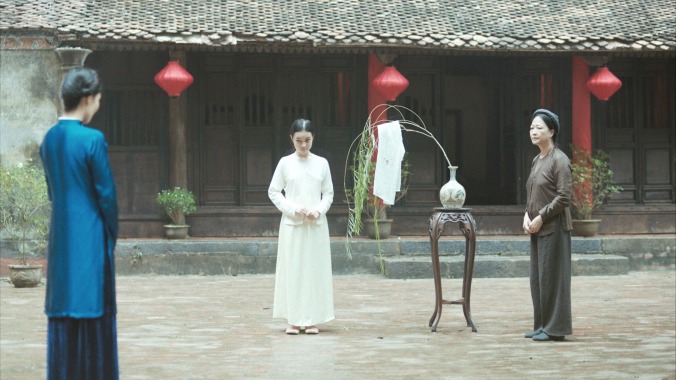A teenage bride finds pleasure inside and outside marriage in the sensuous The Third Wife


It’s not uncommon in Asian cinema to depict female oppression—and resilience—through the historical lens of old patriarchal customs. Stories of entrapped concubines and mistresses in existential crisis take on the operatic dimensions of high tragedy; execution and suicide and all sorts of unhappy endings are meant to indicate just how unlucky it is to be born a girl in a world of arranged marriages, polygamy, or both. Ash Mayfair’s voluptuous directorial debut, The Third Wife, recalls the best of these miserable wives tales, particularly Chinese director Zhang Yimou’s Raise The Red Lantern (1993), a microcosmic look at warring spouses within the confines of an austere compound. But Mayfair’s luxuriant first feature, set in the countryside of 19th-century Vietnam, treads territory that few male visions of the struggle against the patriarchy have covered.
A chubby-cheeked teenage bride, May (Nguyen Phuong Tra My), is delivered by ceremonial canoe and a gentle current to her new home, an Edenic rural estate closed off by gates where her soon-to-be husband, Hung (Le Vu Long), waits rigidly alongside his first wife, the guarded and graceful Ha (Tran Nu Yên-Khê), and second wife, Xuan (Mai Thu Huong Maya), a tender, sexually frank beauty. Ton That An’s delicate string score resonates throughout as the realities of the estate are softly revealed. Mayfair’s script keeps dialogue to a minimum, opting instead for the unspoken communication of peeks and glances, and realizations made through quiet observation.
May’s wedding reception, captured in the soft orange glow of evening lanterns, lays out the family power dynamics. As lady of the house, Ha—the only wife to produce a male heir—stands assuredly next to Hung, while Xuan captivates with dulcet vocals as May looks on in admiration. A bedroom consummation later that night unfolds as a wordless but palpable first encounter; a clunky and painful cherry-popping follows the evocative tradition of slurping an egg yolk nestled within the bride’s belly button. Cinematographer Chananun Chotrungroj shoots vibrant landscape portraits of foliage-dense mountainsides and towering bamboo forests, and rousing close-ups on ground level—of dew globs clinging to broad and verdant leaves, of silkworms twisting their bodies into existence, of long black hair swaying against an expanse of bare skin.
What’s perhaps most striking about The Third Wife is Mayfair’s measured approach, rare for a debut and a young filmmaker. Fleshy and sensual, May’s sexual awakening never veers into provocation so much as it glides natural, titillating facts of life into her purview. The discovery of a sexual tryst one foggy morning reveals the pleasures of eroticism divorced from marriage, as does Xuan’s recommendation that the newest member of the family dabble in masturbation; May is uninterested in her husband’s touch, but heeding Xuan’s advice yields bounties, which Mayfair cleverly signifies with a sharp cut to running river water.
While undergoing her own sexual education on the side, May still catches on to the importance of child-rearing to her position in the family. There’s something mildly obscene about her small pregnant body, given her still cherubic appearance and the age gap between her and her husband. But Mayfair approaches the subject with the rare type of resignation that enriches, skirting modern value judgments to more thoroughly explore the many facets of her adolescent concubine’s existence. Even as a big-bellied mistress, May spends her free time with Xuan’s small daughters, who are closer in age to her than May is to the older wives. Tending to crops and livestock through giggles, exchanging whispers in bed, May is very much still a child; her transition extends throughout the film in small steps rather than via a night-and-day transformation. While the other wives consider May a little sister, all three are nevertheless placed in ongoing biological competition over who will produce the second male heir after Ha’s son, a laughably lovesick beta male. Mayfair strikes a middle ground between rivalry and sisterhood, refusing to characterize female relationships in binary ally/hair-pulling-competitor terms.
She doesn’t pull her punches either when it comes to showing female oppression. While the wives snatch freedom wherever they can find it, life is confined to a transactional cycle of matrimony and reproduction at the behest of family honor. Forced into marriage with a local girl not too different from how May appears at the start of the film, Ha’s son rejects the consummation and throws the system out of whack, leaving his young bride obsolete and unwanted by her new family and old. Although the cycles of life and death that belong to the natural world are alluring, and even peaceful in their persistence, an inherent violence pokes through that mirrors an enduring and unjust feminine condition. An unabashedly reticent arthouse film, The Third Wife takes its time drifting through May’s coming of age, which will try the patience of some audiences. But those open to the seduction of Mayfair’s understated drama and its beautiful natural imagery will be handsomely rewarded.